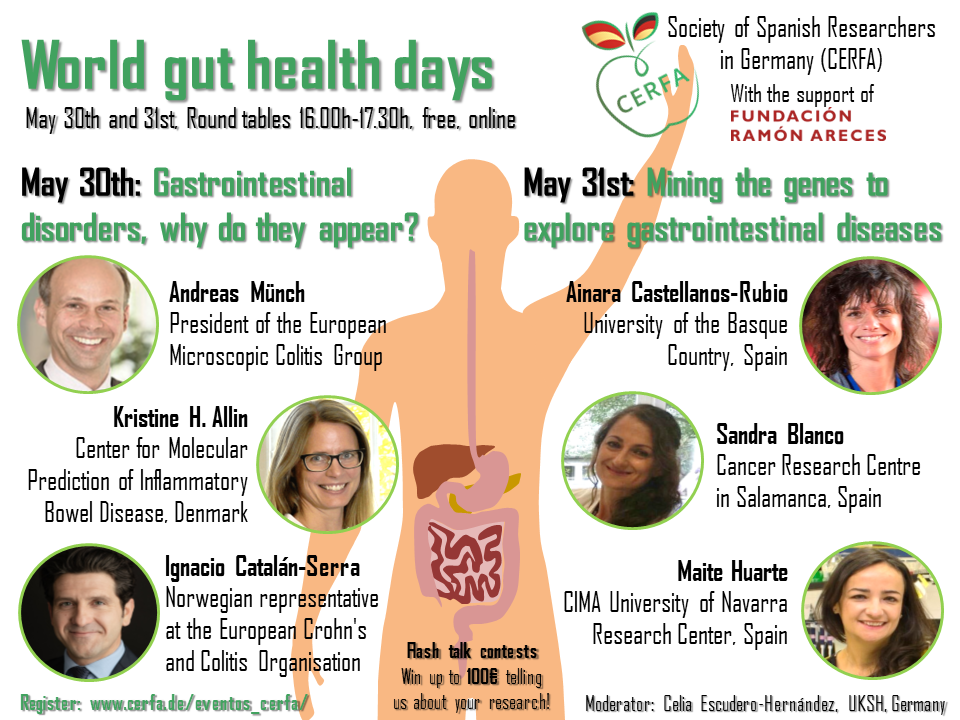Register here: https://www.eventbrite.com/cc/world-gut-health-days-2185989
The digestive system has the most extensive barrier in the body that not only protects us from external threats but tolerate gut microorganisms (the microbiota or “good” microbes) while absorbing nutrients (and also tolerating them). For this, the intestinal cell barrier is continually renewed and the immune system in the intestine remains relatively silent (tolerant). Bad eating habits, stress, lack of exercise or the intake of harmful substances or antibiotics alter our barrier, making it more sensitive, becoming inflamed, not producing sufficiently consistent stools, or allowing pathogenic microorganisms to have easy access and cause infections.
A group of gastrointestinal diseases that is on the rise are inflammatory bowel diseases. These are chronic, difficult to diagnose and treat, and cause severe diarrhoea (microscopic colitis, irritable bowel syndrome) and/or bleeding in the stools due to persistent inflammation (Crohn’s disease and ulcerative colitis). In the most severe cases, severe damage leads to ulceration, compromised repair mechanisms, the appearance of scars, or even cancer.
From CERFA, we want to raise awareness of gastrointestinal disorders, how they appear and what is the current state of research. We will have 2 round tables and 2 flash-talk contests by young scientists (50-100€ prices each day!) organized as follows:
GASTROINTESTINAL DISORDERS, WHY DO THEY APPEAR? (May 30th, 16.00h-17.30h)
The first round table will focus on why gastrointestinal disorders appear and how they are managed, with special attention to inflammatory bowel diseases. We will talk with the President of the European Microscopic Colitis Group Dr. Andreas Münch (Sweden), the Norwegian representative at the European Crohn’s and Colitis Organisation Dr. Ignacio Catalán (Norway), and Assoc. Prof. Kristine H. Allin at the Center for Molecular Prediction of Inflammatory Bowel Disease (Denmark). After the discussion, we will have a flash-talk contest for young clinical researchers (prizes up to 100€!)*
MINIG THE GENES TO EXPLORE GASTROINTESTINAL DISORDERS (May 31st, 16.00h-17.30h)
Here we will learn how genetic information can be exploited to diagnose and treat different diseases… from the information in our DNA (genes), to its copy version the RNA, and beyond… to face how DNA and RNA can be modified due to environmental adaptations and disease (epigenetics). We will talk with Dr. Ainara Castellanos-Rubio, an expert on long non-coding RNA molecules in celiac disease at the University of the Basque Country, Spain; Dr. Sandra Blanco, a master of RNA epigenetics at the Cancer Research Center in Salamanca, Spain; and Dr. Maite Huarte, a specialist on how stress can affect DNA replication and to cancer development at University of Navarra, Spain. After the discussion, we will have a flash-talk contest for young basic-translational researchers (prizes up to 100€!)*
FLASH-TALK CONTESTS FOR YOUNG SCIENTISTS (One contest per day!)
Tell us about your current research and win up to 100€! After the round table with our experts, each of the days from 17h, we organize a flash-talk contest for young researchers (<40 years old). A flash talk is a 2-minute presentation of your work using one slide. Upon registration, a title and short summary of the flash talk will be required to participate. Flash talks will be accepted until May 25th. Due to time restrictions and in case we get many participants, a scientific committee by CERFA will pre-select up to 10 flash talks for each of the contests and participants will be notified by May 26th at the latest. If accepted, the participant should make 1 slide summarizing his/her research and sent to the organizer at least one day in advance (celia.escher@gmail.com, title: CERFA flash talk May 30th or 31st). A minimum of 6 flash talks will be required for the contest to happen each day. On May 30th, the focus will be on clinical research in gastrointestinal disorders (of any kind); while on May 31st, the focus will be on basic and translational research in gastrointestinal disorders and/or genetics and epigenetics. Our experts of the day (speakers and moderator) will evaluate the work, the presentation, and how well it adapts to the audience (focus on the general public!). We will give two prizes for each of the contests: the first prize will consist of 100€, and the second prize of 50€.
Find tips on how to prepare and present a memorable flash talk here: https://blogs.embl.org/events/2020/09/15/how-to-present-a-memorable-flash-talk-in-12-easy-steps/
FREE REGISTRATION: https://www.eventbrite.com/cc/world-gut-health-days-2185989



